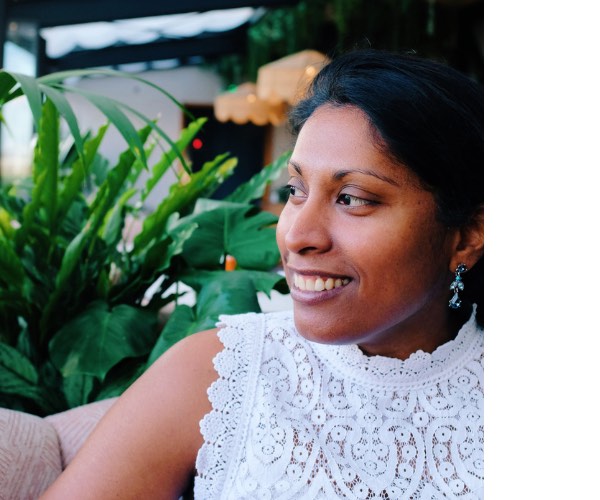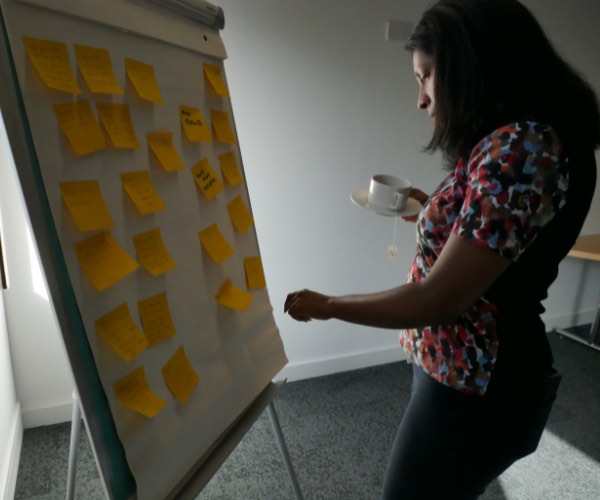
Nov 20 2023.
views 123It is heartening to see Sri Lankans the world over taking a stand and doing amazing things. One such person I met recently at a meeting of creative women in London is the affable Sathya Bala. The founder of True Change | My Skin My Story, Sathya is driven by her passion for championing inclusively and equity. Sathya wears many hats and is a CEO, Founder, entrepreneur, community leader and change maker.

Q What is My Skin My story about?
My Skin My Story is a global community I launched in June 2020. Our mission is to connect, empower and elevate women of colour around the world to define success on their terms and be empowered to make positive change at home, work and in the community. I run events regularly for the community where we spotlight our stories, share resources, upskill each other and expand our network.
My own experiences as a Sri Lankan Tamil woman, born in Singapore, growing up in Australia and working in the UK have been a driving force in creating this community. My Skin My Story is one of my passion projects, where I volunteer my time and platform to uplift women of colour as I know from first-hand experience this is a community not often championed or given the spotlight.
I wanted to find a space that was inclusive to women of colour, no matter what your job, your age, or your background. So I created one. I wanted us to celebrate our unique stories but also embrace our shared experiences of navigating race and gender in a world not built for us to succeed by default. It is this intersectionality of having multiple layers of identity, race, gender and so many other things which is our superpower.
Q And True Change?
I left the safety of a successful corporate career at Chanel, Deloitte, HSBC, and Barclays (to my parents’ slight horror!) to launch my own consulting business True Change over 2 years ago. True Change partners with organisations to build inclusive and equitable workplaces where people and businesses thrive, using the power of data and stories. I have been able to combine my superpowers, professional skills and passion to lead a business that can have a real impact. We run empowerment programmes to equip women and people of colour who have experienced barriers at work with the confidence and tools to succeed in their careers. We equip leaders and decision-makers with skills and insights to change cultures and processes to be more inclusive. Also, we run communities, so organisations can share challenges and best practices on how to make organisations more inclusive and how to use data to make that happen.
It is really rewarding work, and the business is my way of creating a legacy where workplaces are better for the people coming up behind me. It is personal. I am trying to make sure the barriers I and so many others faced are taken away. When individuals succeed, businesses thrive.
Q Why are inclusion and equity important to you?
You will hear me mention intersectionality, inclusion and equity a lot. That is because for me these words bring to life very real experiences I have had to navigate.
I lived an intersectional life before I knew the word. Professor Kimberlé Crenshaw coined the term intersectionality in 1989 to explain how race, ethnicity, class, gender, sexual orientation, disability, religion, age, and other characteristics intersect and overlap with each other and affect the experiences of marginalised individuals or groups. I can’t separate being brown from being a woman, especially growing up in the Western world. Those things intersect and sometimes multiply the barriers I have faced. Intersectionality is more than a word, it has helped me describe, process and validate my experience.
That is why inclusion and equity is so important to me. Making sure no matter who you are, or how many layers of identity you have, our workplaces and society allow us all to thrive, reach our potential and contribute to the best of our ability. When we hold some people back, we hold all of us back. I am a data nerd and there is so much evidence that inclusion and equity are win-win, not just for people who experience bias and barriers, but for everyone.
Diversity is the reality of life, we are all different. Inclusion means all those different people and the groups they belong to have power, have a voice and are heard. Equity is the end game. That one’s identity does not affect our chances at life and in work. Equity is recognising different groups face different barriers, and we need to tailor our approach to remove those barriers depending on who is facing them and how big they are. And we can’t tackle barriers one issue at a time, we need an intersectional approach. We can’t look at racial equity without looking at gender equity for example as someone like me is affected by both.
Q Why do you think building relationships and storytelling are key to advancing inclusion and equity?
We cannot drive positive lasting change if we do not talk about the issue, uncover truths, interrogate the root cause, invest in solutions and measure progress. Data and stories are critical ingredients.
Data helps us be accountable, have clarity of direction, know what success looks like and be transparent with our progress. Stories unify us by revealing our shared humanity. Stories open dialogue, build commitment to change, help us learn and most importantly stories can inspire action. We need to engage the head (with data) and the heart (with stories) to keep the momentum up as true change will take time.
Q Creating an anti-racist culture is important to you. How do you go about creating such a climate?
Creating an anti-racist culture means breaking down barriers and building up spaces, systems, and societies where all people are allowed to thrive. That means listening to the people affected by racism and addressing the barriers they face, using data to direct effort where it is most needed.
Building an anti-racist culture also cannot be done in a vacuum. Race intersects with so many other ‘isms’. Anti-racist cultures are healthy and prosperous for the most intersectional and marginalised of identities. That includes people of colour who are also women, disabled, neurodiverse, queer, and so on.
Q Do you believe that many organisations are struggling to improve racial inclusion?
We are all on a journey to inclusion because, let’s be honest, topics like race were taboo subjects not that long ago. People still struggle with the fear of making a mistake. But fear shouldn’t outweigh the desire to address racism. But I get it. Fear and a lack of knowledge of what to do is real. I believe the struggle organisations face is not knowing how to go from talking about commitments and plans to taking real action. Having worked in risk, audit, strategy and data governance across large organisations, I understand how change works. Racial equity needs to be treated like any transformation, with resources, plans, evidence, measures and accountability.
Q What can they do to change the status quo?
It all comes down to the amount of effort leaders and decision-makers are willing to put in, personally and professionally. Through my business, True Change, I work with organisations to understand inequities, listen to colleagues’ stories, and act on them. Once racial, gender and other barriers become known, a lack of action is the quickest way to lose trust.
So organisations need to get used to the practice of “you told us this and we did that.” Using the data and stories from people who experience barriers to drive action and being transparent on what we are doing about it. Even if it means admitting where we got it wrong or where it is taking us longer to address issues.
Organisations need to invest in people and budgets to look at inclusion and equity strategically, develop a plan informed by data and lived experiences of where the real issues are, use data to measure progress and have clear ownership of who is driving those actions. Change will never stick if it’s reliant on volunteers doing tasks on the side of their desks with no budget. Or if we are not transparent, even when progress is not linear. We can’t hide from the setbacks, we need to acknowledge them and learn from them.
Q What has been your most profound revelation while working on inclusion and equity?
It may sound really simple, but that “revelation” moment came in building My Skin My Story and seeing it grow. I have run 30 events in 3 years for women of colour and I see the impact each event has. I realised the power of storytelling and empowering under-represented communities in speeding up change. There is power in simply bringing people together, but also tapping into experts so we can share knowledge on things like wealth management, career development, speaking skills, imposter syndrome, etc. It is important to empower individual change-makers in society as well as organisations. Sometimes the most exciting change comes from the bottom up, from the people.
Q What role does data play in advancing inclusion and equity?
I have worked in data governance for many years. So I know first-hand the role of data in building equity and measuring progress. It is about prioritising your key success outcomes based on where the most significant barriers are—and then coming up with measures specific to those. So, if for example, you are not retaining women due to a lack of promotions, investigate that. Do a pulse survey, and listening groups, and look at external studies that shed light on the issue. Where is the root cause? Is it a lack of sponsorship so certain groups do not get considered? Is it a lack of transparency of openings? Is there bias in how some groups are assessed for potential? Data will help us pinpoint the issues we need to address.

Q Can you share one piece of practical advice people can implement when thinking about tackling inclusion and equity?
Find the personal hook that makes this something you are committed to, whether it is the business angle (because better inclusion leads to better performance), human rights, or connection to family, friends or colleagues. Inclusion and equity work requires us to be committed to making changes, personally and professionally. And it is a long game. So find what gets you fired up and find a couple of trusted people who are fired up too, so you can push each other along. Tell us about the upcoming event you will be hosting during Empower Hour: Being Unapologetically You for women of colour.
I am excited about our next Empower Hour, this is one of our event formats where we focus on an upskilling topic with an inspiring woman of colour guest speaker. On Tuesday 21 November 12-1 pm GMT, I will be hosting a free virtual session with Aggie who is a business owner, coach and co-founder of Black Inclusion Week. Aggie will share her story of owning her identity as well as practical insights on how we can be unapologetic, own our story, and be bold and joyful while doing it. These events are open to anyone who identifies as a woman of colour and as a volunteer-led community, we would love your help to spread the word.
How can people tune in?
Register or share our My Skin My Story event: https://www.tickettailor.com/events/myskinmystory/1054597
Follow Sathya: https://www.linkedin.com/in/sathya-bala-mystory/
Find out more about True Change and My Skin My Story:
http://www.truechange.co
http://www.myskinmystory.com
0 Comments